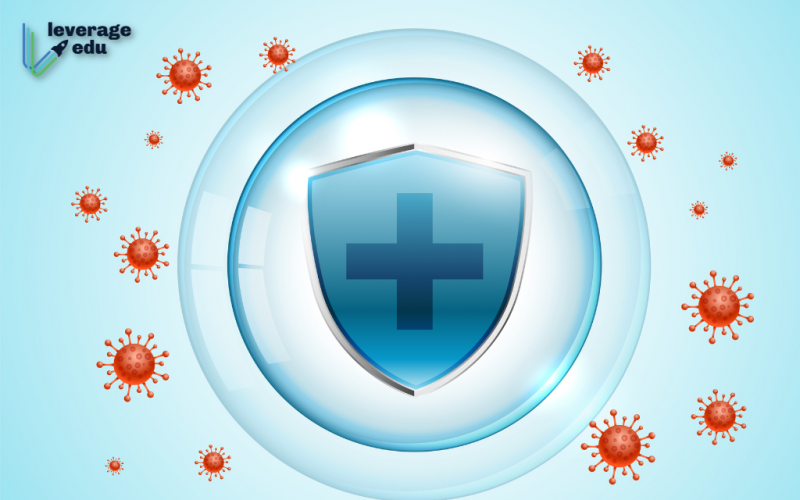Microbiology is a rapidly growing field. And the demand for professionals in this field will increase in the future. Microbiology is a popular career choice among students. The scope of microbiology is spreading to various industries including environmental industries, healthcare industries, research centres, and treatment centres. And if you are interested in pursuing microbiology, continue reading this blog created just for you about how to become a microbiologist.
This Blog Includes:
What is Microbiology?
Microbiology is the stream in biology that deals with the study of microorganisms like bacteria, viruses, fungi etc. Microbiology includes studying the interaction of various organisms with different environments. In order to become a microbiologist, students can begin by pursuing a BSc or MSc in microbiology. There are many opportunities offered to microbiology students that will allow both personal and professional growth of students.
Roles and Responsibilities of a Microbiologist
The following are the roles and responsibilities of a microbiologist:
- Microbiologists focus more on research and identifying the characteristics of microorganisms
- They also focus on the development of new sterilization processes and techniques and develop new drugs, vaccines and treatments for diseases
- Food microbiologists focus on identifying microbes and healthy bacteria that can be used in the food development process
- Microbiologists are also responsible for identifying new microorganisms and categorising them according to their taxonomy
- They also assist biotechnicians and lab workers working on a research project
Steps to Become a Microbiologist
The following are the steps to becoming a microbiologist:
Pursue Higher Secondary Education
To pursue a bachelor’s degree in microbiology students must have completed their 10+2 in the science field including biology as a subject and should score a min. of 50% in the chosen subjects. And to continue their studies, students who wish to pursue their master’s must have completed their bachelor’s in microbiology, zoology or botany.
Obtain a Bachelor’s Degree
To become a microbiologist or become a professional in the field of microbiology students can pursue a bachelor’s in microbiology. And to increase their knowledge in the field of microbiology, students can choose to pursue masters in the same. Students who wish to pursue higher education in the subject can choose to study PhD and enhance their professional opportunities.
Get Your Master’s Degree
Getting your master’s degree in psychology will allow you to increase your knowledge about the field plus it will provide you with learnings about advanced topics in psychology and selecting your specialisation. In your psychology masters program, you will learn more about ethical practice, cognitive psychology, personality theories, social psychology and research methods.
Give an Entrance Exam
Every university has different criteria for the selection of candidates which could be merit-based or require you to take an entrance test. Your CUET or NEET scores could be an advantage during your application process.
Gain Work Experience
You may be required to show some relevant work experience in the field of microbiology. Some colleges require students to have at least 2 years of work experience to pursue a master’s or PhD.
Lastly, Look for Job Opportunities
After pursuing your studies you can look for food job opportunities in various fields including chemical industries, food industries, environmental industries, healthcare centres, research centres, treatment labs, agriculture industries and many more.
Skills Required to be a Microbiologist
Microbiologists should be proficient in the following skills to be efficient in their practice:
- Operating lab types of equipment
- Managing and practising in a microbiology lab
- Conducting environmental monitoring
- Participate in microbiology test methods
- Follow and develop effective laboratory procedures
Top Colleges to Pursue Microbiology
The following are the top colleges to pursue microbiology:
Syllabus of Microbiology
The syllabus for Microbiology could vary depending on the university. But the following are the basic topics included in the syllabus of microbiology:
- Introduction to Microbiology and Microbial Diversity
- Biostatistics
- Introduction to Biology
- Bioinformatics
- Microbial Diversity
- Microbial Metabolism
- Biochemistry
- Mathematics
- Cell Biology
- Microbiology
- Mycology Phycology
- Enzymology
- DNA Technology
- Microbial genomics
- Molecular Biology
- Infection Immunity and Diagnostics
- Virology
Job Profile and Salary
The following are the popular career paths for students pursuing microbiology:
| Job Profile | Avg. Salary | In INR |
| Biotechnologist | $61,700 | 50.85 Lakh |
| Food Scientist | $72,422 | 59.69 Lakh |
| Immunologist | $177,000 | 1.45 Cr |
| Mycologist | $74782 | 61.64 Lakh |
| Pharmaceutical Scientist | $95,349 | 78.59 Lakh |
FAQs
A. The University of Oxford, the University of Cambridge, and the Imperial College of London are some of the top colleges to pursue microbiology.
A. Microbiology is the stream in biology that deals with the study of microorganisms like bacteria, viruses, fungi etc. Microbiology includes studying the interaction of various organisms with different environments.
A. The following are the roles and responsibilities of a microbiologist:
Microbiologists focus more on research and identifying the characteristics of microorganisms
They also focus on the development of new sterilization processes and techniques and develop new drugs, vaccines and treatments for diseases
Food microbiologists focus on identifying microbes and healthy bacteria that can be used in the food development process
Well, we hope that this blog has provided you with relevant knowledge on how to become a microbiologist. And if you plan to study the related course or any other course in any other country, contact our study experts at 1800-572-000, and book your free counselling session today. You can also connect with us at Leverage Edu website.

 One app for all your study abroad needs
One app for all your study abroad needs





















 45,000+ students realised their study abroad dream with us. Take the first step today.
45,000+ students realised their study abroad dream with us. Take the first step today.

